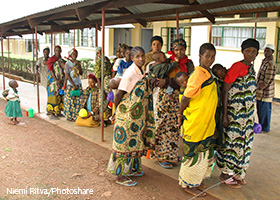 FANTA supports the integration of nutrition assessment, counseling, and support (NACS) into health care services in eight countries, including Tanzania and Zambia. NACS has been scaled up nationwide in Tanzania but to only four provinces in Zambia with support from the United States President’s Emergency Plan for AIDS Relief (PEPFAR). In November 2016, FANTA supported a four-day visit to Tanzania by a delegation of Zambian national and district health officials to learn from Tanzania’s experience integrating NACS.
FANTA supports the integration of nutrition assessment, counseling, and support (NACS) into health care services in eight countries, including Tanzania and Zambia. NACS has been scaled up nationwide in Tanzania but to only four provinces in Zambia with support from the United States President’s Emergency Plan for AIDS Relief (PEPFAR). In November 2016, FANTA supported a four-day visit to Tanzania by a delegation of Zambian national and district health officials to learn from Tanzania’s experience integrating NACS.
Observing FANTA's Work in Tanzania
The Zambian officials observed NACS service delivery at Amana Referral Regional Hospital in Dar es Salaam and at Mbeya Regional Hospital and four health centers in Mbeya. In discussions with district officials, health facility and community service organization managers and staff, and PEPFAR Implementing Partners in Tanzania, the delegation was also introduced to promising practices and solutions to challenges with NACS implementation in Zambia, including: inadequate numbers of nutritionists, supply chain management, and monitoring and evaluation challenges.
“Nutrition is recognized in almost all government sectors, not only at (Tanzania’s ministry of health), and there is high-level support for nutrition services.”
—Nkandu Chungu
District Nutritionist in Zambia’s Kitwe District
Two areas that the Zambian officials found particularly notable were Tanzania’s strong national and regional government leadership and coordination of nutrition interventions, areas in which FANTA has provided extensive technical support and mentoring to government and other partners in Tanzania. Nkandu Chungu, District Nutritionist in Zambia’s Kitwe District, observed that “nutrition is recognized in almost all government sectors, not only at (Tanzania’s Ministry of Health), and there is high-level support for nutrition services.” Dr. Mackford Chipili, District Health Officer for Mkushi District in Zambia, said there was “good partner coordination and collaboration in integrating NACS.”
The delegation also noted differences in how community health workers are supported in Tanzania. Local government authorities and community leaders select people to be trained as community health workers in Tanzania, and once trained, the community health workers receive a government salary. “The (Tanzanian) government’s commitment to supporting community health workers is more sustainable than Zambia’s ad hoc solution of [different] partner incentives,” Dr. Chipili said. In addition, the Zambian officials remarked on Tanzania’s well-defined and structured NACS reporting system from community to national level.
Moving Forward with NACS in Zambia
The visit provided the Zambian officials with new ideas for strengthening NACS implementation and integration. For example, they are considering developing a social and behavior change and communication kit on health and nutrition, and they resolved to advocate for training of more nutritionists. The officials also found Tanzania’s progress with transferring planning and budgeting of nutrition services to local government authorities encouraging for their own decentralization efforts.


